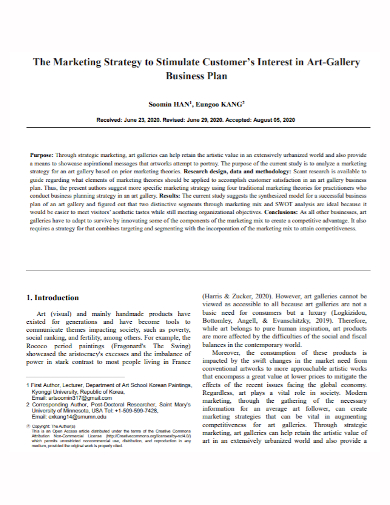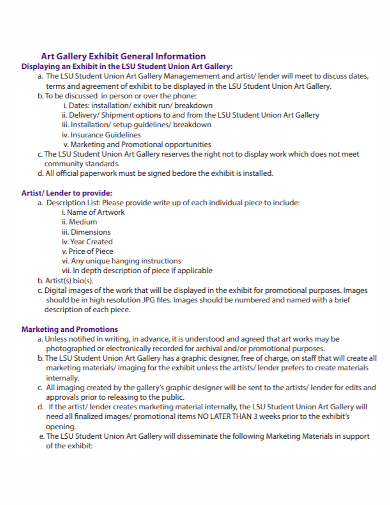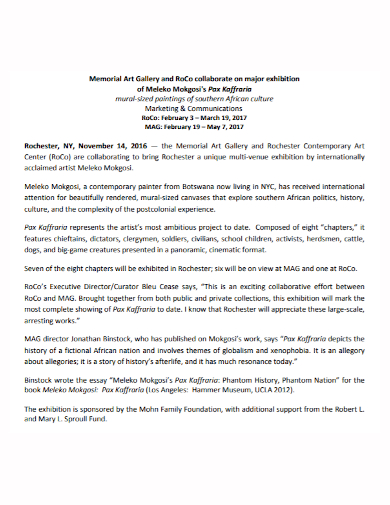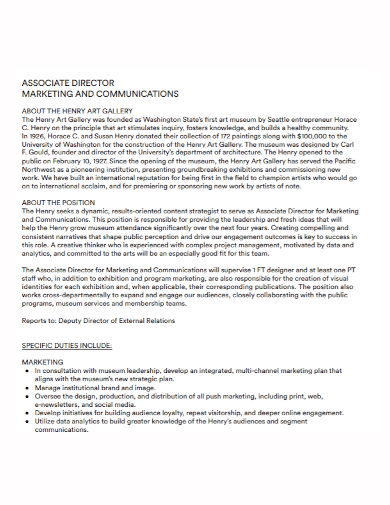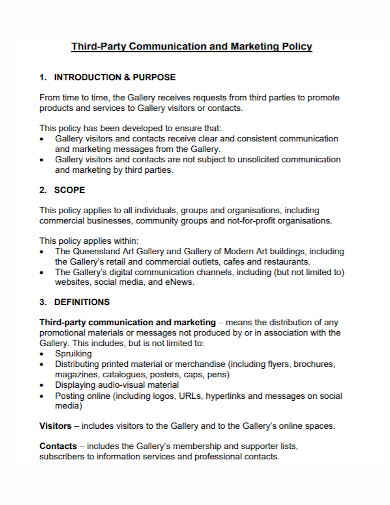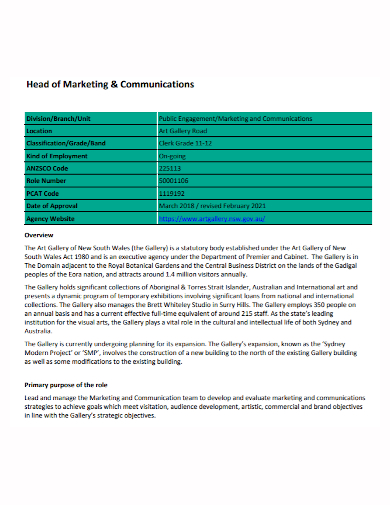The history of a civilization may be visually represented in art galleries. As a result, via the artwork, this visual history captures what life was like at a specific point in time. For example, art may provide details about the individuals who lived at a specific era of time. While no museum can pretend to present a full picture of the past, the lessons we may learn from historical events, miracles, and tragedies are invaluable. To build a solid brand image, get the respect of respected artists, and most crucially, attract a healthy audience, you must market your art gallery. If you need help with this, you’ve come to the right place! In this article, we provide you with free and ready-to-use samples of Art Gallery Marketing that you could use to boost the image of your next exhibit. Keep on reading to find out more!
6+ Art Gallery Marketing Samples
1. Art Gallery Marketing Template

2. Art Gallery Strategy Marketing
3. Art Gallery Promotion Marketing
4. Art Gallery Communication Marketing
5. Marketing Communication Art Gallery
6. Art Gallery Marketing Policy
7. Art Gallery Engagement Marketing
What Is an Art Gallery Marketing?
Art marketing is a systematic method of raising knowledge and interest in an artist or piece of artwork, leading to a desire to collaborate with the artist, gallery, or corporation, to own its products, use its services, or all of the above.
How to Make an Art Gallery Marketing Plan?
Having a marketing strategy to promote your art gallery can assist you in achieving your ultimate objectives and keeping you on track to achieve the results you desire. An Art Gallery Marketing Plan template can help provide you with the framework you need to ensure that you have a well-written and thoroughly-researched plan on hand. To do so, choose one of our excellent templates listed above. Follow these steps below to guide you if you wish to write one yourself:
1. Recognize your target market.
The majority of folks aren’t your clients. Accept this and focus on your area of expertise. This allows you to operate more deliberately, communicating more readily to your target prospects and converting them into clients.
2. Setting Measurable Objectives.
You may begin defining your goals for getting there after you have a clear idea of what you desire. It’s critical that they’re quantifiable and reachable so you’ll know when you’ve arrived and can track your progress. Excessively ambitious objectives may appear exciting and appealing to pursue, but if they are actually unreachable in reality, you will simply set yourself up for failure. Setting a precise number as a goal is a measurable approach to know when you’ve accomplished it.
3. Concentrate on your vision.
Each artist’s version of this phase is generally unique. First and foremost, you must identify your short- and long-term objectives. You’ll have to narrow down your options and define what success means to you. Here are some instances of self-achievable objectives. Remember that the more exact you are, the more likely you are to succeed.
4. Concentrate on your local area.
Social networking is useful, but despite its ability to reach people all over the world, it will not help you sell much art. You’ll have a greater chance if you start where you reside, where people already know who you are and what you do. Find and keep happy customers among them, and they’ll help you sell more work faster than all the advertisements you can purchase or all the social media posts you can produce.
FAQs
What is the most crucial aspect of a marketing strategy?
Any targeted consumer is the most crucial aspect of your marketing strategy. Any marketer’s single most essential duty is to understand their target consumer, and it’s a job that never stops.
Is it necessary for artists to be represented by a gallery?
As a new artist, gallery representation may drastically boost your public exposure and awareness.
What are the benefits of galleries to artists?
Galleries play a variety of responsibilities, both visible and unseen: they incubate and support their artists, frequently going above and beyond the conventional task of putting on exhibits, promoting their artists, and selling their works.
Art galleries may help preserve artistic value in an increasingly urbanized environment by using strategic marketing and by showcasing aspirational themes that artworks try to express. To help you get started, download our easily customizable and comprehensive samples of Art Gallery Marketing today!
Related Posts
FREE 3+ B2B Marketing Strategy Samples [ Email, Digital, Communication ]
FREE 10+ Email Marketing Strategy Samples in PDF | DOC
FREE 6+ SEO Marketing Strategy Samples [ Content, Digital, Company ]
FREE 10+ Marketing Brief Samples in PDF
FREE 10+ Digital Marketing Business Plan Samples in MS Word | Pages | Google Docs | PDF
FREE 29+ Best Real Estate Marketing Postcard Templates in PSD | Indesign
FREE 10+ Retail Marketing Plan Samples in MS Word | Pages | Google Docs | PDF
FREE 6+ Digital Marketing Strategy Samples in MS Word | Pages | Google Docs | PDF
The Essential Content Marketing Checklist for Small Business [ With Samples ]
How to Apply Cost Analysis Templates in Market Research Methods [ How to Analyze, Tips ]
FREE 10+ Dialogue Marketing Samples in PDF | MS Word
FREE 10+ Consultant Marketing Plan Samples in PDF | MS Word
Acceptance of Invitation to Seminar [ What to Write, Purpose, Tips ]
FREE 14+ Marketing Analysis Samples in Google Docs | MS Word | Pages | PDF
FREE 25+ Marketing Samples & Templates in PDF

